Feed Questions Instead of Answers: Making Workshop at Edmedia 2018
Today marks the end of this year’s AACE Edmedia conference in Amsterdam – and what a week it was! 700 participants, a new format with country best paper awards, 5 keynotes, an invited speaker panel with 4 distinguished guests, and, last but not least, 4 different workshops.
The conference opened Monday with a workshop about ‘Making With Kids in Europe – To Foster Digital Literacy, to Make a Better World, and to Build a New Entrepreneurship Education’. Some of Europe’s leading experts on making with children shared their experiences and different approaches. Approximately 15 participants enjoyed an informative, active, and engaging workshop that gave an excellent overview of making tools and projects.
The workshop started with three presentations about teacher education within makerspaces at the University of Technologies Graz (AT), about inspiring social innovation and educational projects at the Waag Society (NL) and about the European initiative DOIT, which explores making as a starting point for early entrepreneurship education.
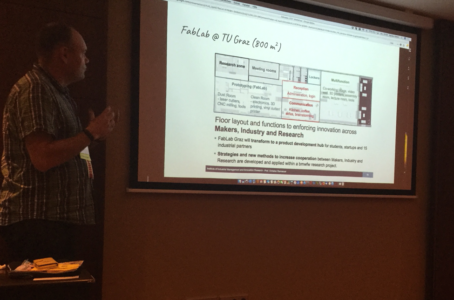
Martin Ebner from TU Graz introduced the audience to the potential of making for teacher education and teacher professional development. The Austrian university TU Graz has just completed a new 800 m2 fablab that is scheduled to open in summer 2018. In August 2018, the university is running maker days for 10-14 year-olds. These are just a few of the ongoing activities around making and teacher education. One participant asked Martin Ebner a question that shows typical barriers to technology: ‘How much programming do I need to know?’ The answer was encouraging for anyone who is new to making and does not have a computational science background or other prior coding experience: ‘We use scratch and pocket code and have 2 hours of introduction’ – yes, it is really for everyone!
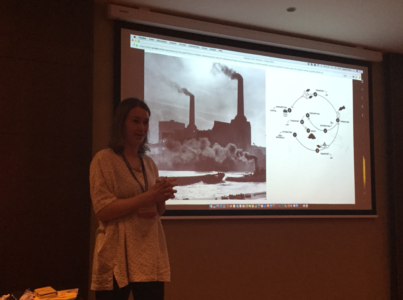 Karen van der Moolen from the Waag Society gave an inspiring overview of the organization’s mission and scope: ‘It is our mission to give technology back to the people’. The local Amsterdam fablab is open to the public for free every Thursday from 4-8pm, so EdMedia attendees had the opportunity to visit and explore. The presenter’s advice is helpful for anyone who wants to visit a local maekrspace or fablab: ‘Don’t come in a large group, just stop by and check it out for yourself’. In addition to the fablab, the organization develops maker spaces in 10 libraries across the city, training 200 librarians in maker education. Karen also gave an outlook on two current projects ‘Hacking Animal Extinction’ and ‘Fluid Identities and DIY Clothing’.
Karen van der Moolen from the Waag Society gave an inspiring overview of the organization’s mission and scope: ‘It is our mission to give technology back to the people’. The local Amsterdam fablab is open to the public for free every Thursday from 4-8pm, so EdMedia attendees had the opportunity to visit and explore. The presenter’s advice is helpful for anyone who wants to visit a local maekrspace or fablab: ‘Don’t come in a large group, just stop by and check it out for yourself’. In addition to the fablab, the organization develops maker spaces in 10 libraries across the city, training 200 librarians in maker education. Karen also gave an outlook on two current projects ‘Hacking Animal Extinction’ and ‘Fluid Identities and DIY Clothing’.
What is the most important lesson of making? Karen van der Moolen summarized the learning benefits of making as an opportunity to ‘feed questions, instead of answers’:
‘It’s okay to not know. I am your teacher, but I don’t have any clue how to answer your question. And that is okay, we’ll work it out together’.
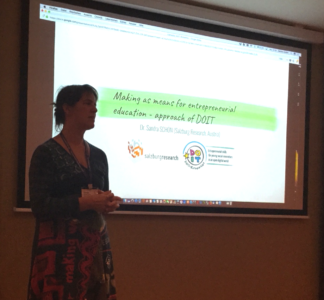 Lastly, Sandra Schoen introduced DOIT, an EU project that uses making for early entrepreneurial education, targeting children 6 to 16 years of age. Makerspaces and making activities are a catalyst for entrepreneurial and innovative thinking to tackle complex problems: ‘You can’t think outside the system when you are in the system’.
Lastly, Sandra Schoen introduced DOIT, an EU project that uses making for early entrepreneurial education, targeting children 6 to 16 years of age. Makerspaces and making activities are a catalyst for entrepreneurial and innovative thinking to tackle complex problems: ‘You can’t think outside the system when you are in the system’.
After the introductory talks it was time to get the participants in the mindset of making and collaborating. The presenters chose the ‘Marshmallow challenge’ – a team activity that sent the attendees on a quest for building the highest tower able to support a marshmallow, using 20 sticks of Spaghetti, one yard of tape and one yard of string.
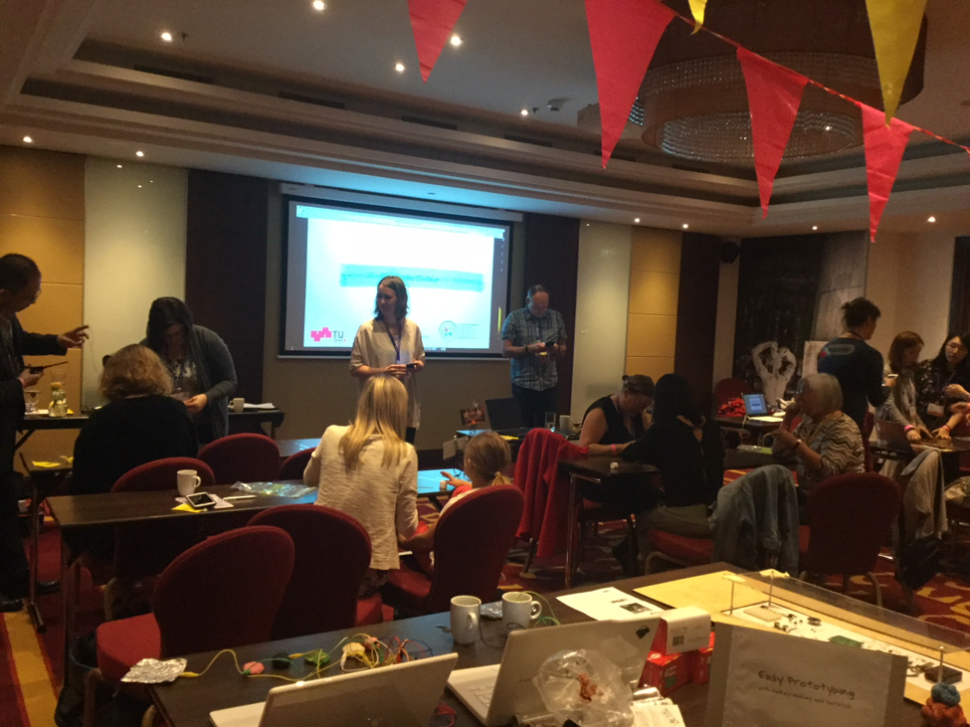
The most exciting part of the workshop was a Maker fair, which introduced participants to tools like MakeyMakey and BBC micro:bit, programming mobile or web apps such as scratch and PocketCode, 360 design with panoform, DIY building projects such as circuits, smart gloves or even projectors.
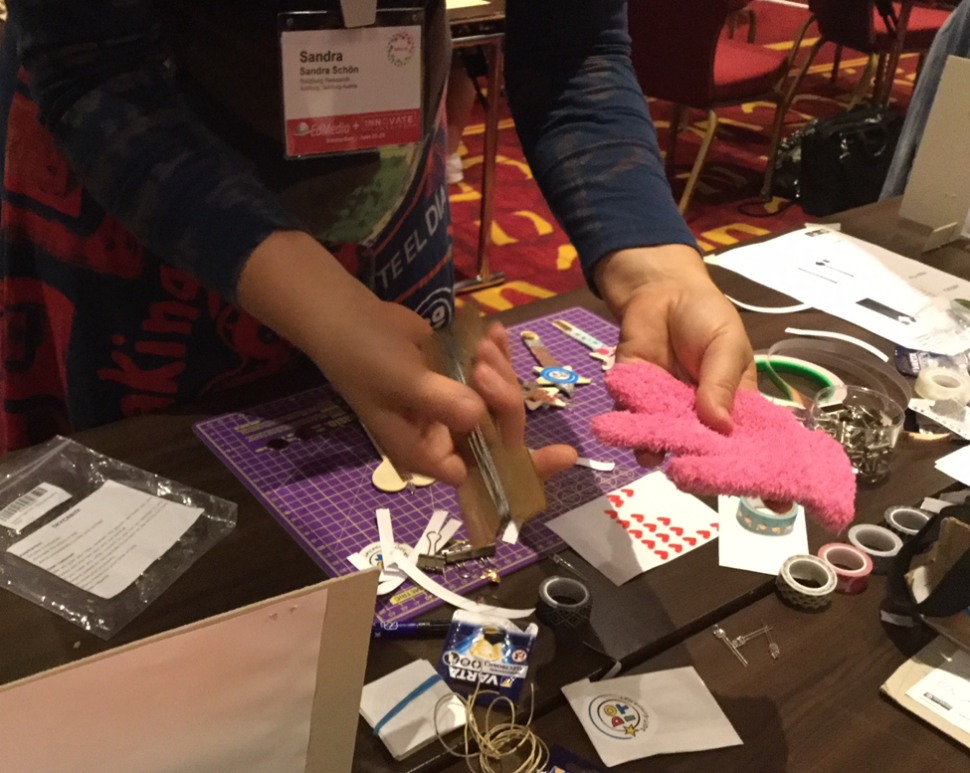
I walked away with pedagogical inspiration, a deeper technical understanding, heightened curiosity – and a pledge for making activities I want to try out within the next 4 weeks. Workshop material are available online: https://www.doit-europe.net/archives/493.
